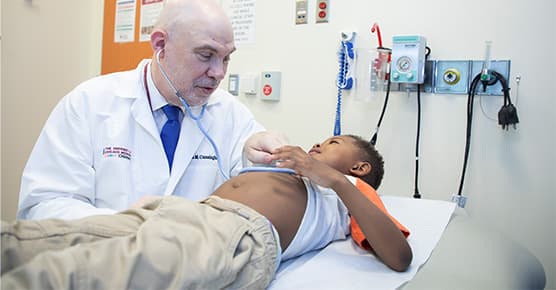Pediatric Sarcoma Research
From Laboratory Bench to Patient Bedside
Researchers at the University of Chicago Medicine are leaders in the ongoing study of the biology and genetic basis of soft tissue and bone sarcomas and other cancers. Their findings could lead to new treatments that have better outcomes and fewer side effects than chemotherapy and radiation.
"Translational" research projects in the orthopaedic surgery and radiation oncology departments are aimed at bridging the gap between the laboratory and the clinic. For example, orthopaedic surgeons Hue H. Luu, MD, Rex C. Haydon, MD, PhD, and Tong Chuan He, MD, PhD, are conducting research to understand the basic biologic mechanisms underlying why osteosarcoma forms in the first place. They are using approaches to stimulate osteosarcoma cancer cells to become normal bone forming cells. By forcing these cancer cells to differentiate (i.e. change into) bone cells, the cells become non-cancerous and are less likely to cause mortality. The laboratory is also conducting research to understand which genes control the ability of osteosarcoma cells to spread. The researchers hope to identify genes (i.e. genetic markers) that predict which patients have cancer cells that have already, or are likely to, spread to other parts of the body. Knowing this may eliminate the need for chemotherapy in a select group of patients who will never develop metastases.
Radiation oncologist Philip Connell, MD, is working to identify molecular markers of treatment resistance, and to develop new anti-cancer agents that can overcome these molecular hurdles. His new ongoing projects involve the design of new drugs that modify DNA repair. With these studies, researchers have the potential to discover new chemical compounds with wide-ranging impacts — from improving present oncology therapies to blocking the mutagenic effects (causing genetic mutations) of chemotherapy and radiotherapy.
At the Forefront of Cancer Research
Our physicians and investigators are members of the world-famous University of Chicago Medicine Comprehensive Cancer Center, an NCI-designated Comprehensive Cancer Center — a consortium of select centers leading the nation in cancer research and providing patients with more effective health care. These teams of researchers work collaboratively, across scientific disciplines, to explore and develop innovative ways to fight and cure cancer. Because of our high level of expertise and access to the latest therapies, patients from the Midwest, the nation and around the world come to our cancer program for treatment.



